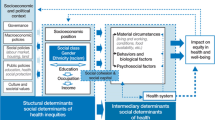Abstract
The challenge for those responsible for funding, brokering and assessing the merit of proposed Indigenous research is to identify and then work co-operatively with appropriate representatives of Indigenous interests in order to increase the flow of benefits from research to Indigenous peoples. Experience in Australia has shown that this is not a straightforward process. In this paper we indicate some reasons why it is important for the research community to broker research with representative Indigenous organisations and to involve Indigenous peoples in the ethical assessment and conduct of research. We then identify some barriers to the achievement of these objectives and outline recently developed interventions from the field of health research that aim to promote a more effective working relationship between Indigenous peoples and members of the research community.
Similar content being viewed by others
Notes
We have used the term Indigenous ‘peoples’ to reflect the fact that Aboriginal and Torres Strait Islander peoples in Australia do not represent a homogenous group.
References
Anderson, I., Griew, R., & McAullay, D. (2003). Ethics guidelines, health research and Indigenous Australians. New Zealand Bioethics Journal, 4(1), 20–27.
Australian Research Council (ARC) (1999). Research of Interest to Aboriginal and Torres Strait Islander Peoples; Commissioned Report; 59. Canberra: Commonwealth of Australia.
Brady, M. (1980). The problem with ‘problematising research’. Australian Aboriginal Studies, 1, 18–20.
Dodson, M. (2000). Human Genetics: Control of research and sharing of benefits. Australian Aboriginal Studies; Spring–Fall, 56–71.
Dunbar, T., Arnott, A., Scrimgeour, M., Henry J., & Murakami-Gold, L. (2004). CRCATH 1997–2002; Working towards change in Indigenous health research: LINKS Project research report. CRC for Aboriginal Health, Darwin.
Dunbar, T., & Scrimgeour, M. (2005). Ethical assessment of Indigenous Health Research: A Review of the literature. Melbourne: Onemda, VicHealth Koori Health Unit. Discussion Paper no. 14.
Garvey, G., Towney, P., McPhee, J., Little, M., & Kerridge, I. (2004). Is there an Aboriginal bioethic? Journal of Medical Ethics, 30, 570–575.
Gillam, L. (2000). The new national statement on ethical conduct in research involving humans: Commentary. Monash Bioethics Review Ethics Committee Supplement, 19(1), 1–13.
Gillam, L., & Pyett, P. (2003). A commentary on the NH&MRC draft values and ethics in Aboriginal and Torres Strait Islander health research. Monash Bioethics Review, 22(4), 8–19.
Henderson, R., Simmons, D., Bourke, L., & Muir, J. (2002). Development of guidelines for non-Indigenous people undertaking research among the Indigenous population of north-east Victoria. Medical Journal of Australia, 176(20), 482–485.
Humphery, K. (2000). Indigenous health and ‘Western research’. Melbourne: VicHealth Koori Health Research & Community development Unit. Discussion Paper. no. 2.
Kamien, M. (1999). (Letters to the Editor) New doctor. Spring, 23.
Maddocks, I. (1992). Ethics in Aboriginal health: A model for minorities or for all? Medical Journal of Australia, 157, 553–555.
McKendrick, J., & Aratukutuku Bennett, P. (2003). The ethics of health research and indigenous peoples. Monash Bioethics Review, 22(4), 20–25.
National Health and Medical Research Council (NHMRC) (1999). National statement on the ethical conduct of research involving humans and supplementary notes. Canberra: NHMRC.
National Health and Medical Research Council (NHMRC) (2001). Human research ethics handbook: Commentary on the national statement on ethical conduct in research involving humans. Canberra: NHMRC.
National Health and Medical Research Council (NHMRC) (2003). Values and ethics: Guidelines for ethical conduct in Aboriginal and Torres Strait Islander health research. Canberra: NHMRC.
National Health and Medical Research Council (NHMRC) (2005). Keeping research on track: A guide for Aboriginal and Torres Strait Islander peoples about health research ethics. Canberra: NHMRC (in press).
Rowse, T. (2002). Indigenous futures: Choice and development for Aboriginal and Torres Strait Islander Australians. Sydney: University of New South Wales Press.
Sanders, D., Labonte, R., Baum, F., & Chopra, M. (2004). Making research matter: A civil society perspective on health research. WHO Bulletin, 82(10), Geneva.
Scrimgeour, D. (1997) Community control of Aboriginal health services in the Northern Territory. Alice Springs, N.T.: Menzies School of Health Research (Occasional paper series, 2/97).
Sporle, A. (2003). Commentary on Humphery and Anderson, Griew and McAullay. New Zealand Bioethics Journal, 4(1), 29–30 (February).
Sullivan, P. (1996). All free man now: Culture, community and politics in the Kimberley region, North–Western Australia. Canberra: Australian Institute of Aboriginal and Torres Strait Islander Studies.
Thomas, D. (2004). Reading doctors’ writing: Race, politics and power in Indigenous health research, 1870–1969. Canberra: Aboriginal Studies.
Uwankara Palyanku Kanyintjaku (UPK) (1987). UPK – Strategy for a well-being project in Central Australia. Alice Springs, N.T.: Nganampa Health Council.
World Health Organisation (2003). Indigenous Peoples & Participatory Health Research: Planning & management – Preparing research agreements. accessed 27 June 2004,<http://www.who.int/ethics/indigenous_peoples/en/print.html.
Acknowledgements
This paper derives from a presentation to the NHMRC, AHEC National Conference, May 2005, Canberra. We acknowledge the valuable advice received from the anonymous reviewer of an earlier draft of this paper.
Author information
Authors and Affiliations
Corresponding author
Rights and permissions
About this article
Cite this article
Dunbar, T., Scrimgeour, M. Ethics in Indigenous Research – Connecting with Community. Bioethical Inquiry 3, 179–185 (2006). https://doi.org/10.1007/s11673-006-9018-1
Received:
Accepted:
Published:
Issue Date:
DOI: https://doi.org/10.1007/s11673-006-9018-1




